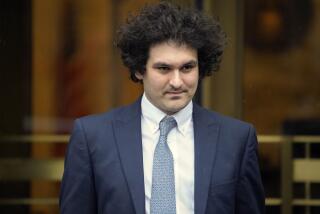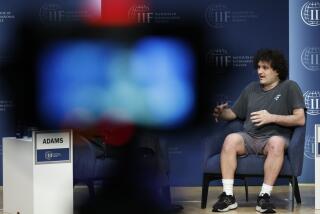Seeking a ‘New Financial Order’
- Share via
Millions of individual investors could have saved themselves enormous sums of money, and an equivalent amount of grief, by taking Robert Shiller’s advice three years ago.
In his book “Irrational Exuberance,” published in spring 2000, the Yale University economics professor argued that the stock market had reached perilous heights and was doomed to a miserable performance in the years to follow.
At a time when many on Wall Street were afraid to question the insanity of the bull market bubble, Shiller warned people to diversify their all-stock portfolios or risk ruin. It was a brave call, came exactly at the market peak and has since made this soft-spoken academic an epic figure in the annals of finance.
Now Shiller is back with another book that also holds warnings of sorts -- this time, about societal wealth inequalities and the need to mitigate what he calls “the risks that really matter in our lives.”
If “Irrational Exuberance” was a sober assessment of a situation that was well known yet widely defended -- the nation’s infatuation with stocks -- “The New Financial Order” is a dissertation on problems many people don’t know they have. Or if they recognize them, they’d have a hard time imagining solutions.
Shiller, however, has let his imagination run in this book, which he says is the culmination of years of thought.
For Americans now as turned off by stocks as they were turned on three years ago, and generally more fearful of their financial future, the 57-year-old Shiller’s ideas just might resonate.
He argues that the public good demands the development of new financial instruments and contracts that are relevant to the lives of average people worldwide.
“Until now, the focus of almost all financial innovation has been found in traditional stock markets and other financial markets,” Shiller writes.
Yet “far more important to the world’s economies than the stock markets are wage and salary incomes and other non- financial sources of livelihood such as the economic value of our houses and apartments. This is where the bulk of our wealth is found,” he says.
Hence, at the top of his wish list for a new financial order are instruments to guard “ordinary riches.” A person’s future earnings power, for instance, could be protected via “livelihood insurance,” Shiller proposes.
He uses the example of someone who is considering a career as a biochemist, focusing on a particular type of virus. It would take years to pursue a degree in that field, and the education expenses would be high.
The ultimate benefits to society might be huge if this person succeeds in his field. His income also might turn out to be huge. But the risks might keep him from pursuing his dream.
What if, Shiller asks, this person could buy an insurance policy that would guarantee him a supplemental income in the event that his salary as a biochemist isn’t what he expected? He might pay for the policy by agreeing to give the policy issuer a certain percentage of his income over a period of years.
Similarly, Shiller proposes the widespread development of home equity insurance, so property owners could guard against declines in home values -- protecting what is for many families their most important asset.
This concept has been tried experimentally in a few cities. The idea isn’t to insure the specific value of a home but to base the insurance on an index that measures average property values in a particular area.
Some entrepreneurs have proposed other ways to insure home values, such as through futures contracts, an idea Shiller also has toyed with. (See accompanying story on this page.)
“The New Financial Order,” published by Princeton University Press, maps out Shiller’s other big ideas that speak to the book’s subtitle, “Risk in the 21st Century.”
Better Diversification
Global markets should be developed for securities that would allow investors to bet on entire economies, not just stock markets or individual stocks, Shiller argues. These securities would provide a new level of portfo- lio diversification for investors worldwide, he said.
He also proposes income-linked loans, which would allow borrowers to effectively sell shares in their future income.
And he would reform Social Security so that, as he puts it, “risks are shared between generations.” This issue is potentially explosive, but Shiller argues that it makes no economic sense to promise retirees a fixed income no matter what happens “to the fraction of the population that is retired or the income of the working people relative to the income that retired people once had.”
On a book tour visit to Los Angeles recently, Shiller conceded that many of his ideas may at first sound “out there.” He believes it’s just the opposite.
Why, he asks, wouldn’t companies, financials institutions and governments worldwide want to support new markets that could allow individuals to lower some of the biggest risks they face -- and in doing so, allow them to take on other risks that could make society better off in the long run, and more efficient?
‘Not Enough Action’
He is critical of academia for, in his view, failing to think more about financial innovation that would improve people’s everyday lives. Within academia, he said, “there aren’t enough people who are trying to make the world a better place. There’s too much description and not enough action.”
Much of Shiller’s book focuses on the idea that capitalistic societies shouldn’t resign themselves to “gratuitous economic inequality” within their population -- that is, “inequality that cannot be justified on rational grounds in terms of differences in effort or talent.” He is aware that, to some ears, that kind of talk smacks of socialism.
Wrong, Shiller retorts. His ideas, he said, are about making free financial markets even more important, and government perhaps less so. What, he asks, is leftist about encouraging people to be more venturesome?
Shiller, married with two sons, lays out a persuasive case for his proposed new order. Yet there are, naturally, huge practical obstacles to its development.
For one, many of the new instruments he discusses are “derivative” securities: contracts whose value is derived from an underlying asset or income stream. But assessing an individual’s future income, for example, is no simple task. New databases would have to be developed, Shiller said.
Indeed, much of his blueprint relies on the premise that governments and financial institutions would know much more about people’s activities, incomes and assets.
Shiller doesn’t believe this “Big Brother” issue is worrisome. “The IRS already has data on all of your income and your entire life,” he argues. But he may be understating genuine concerns many people would have.
What’s more, given that much of the population has a very difficult time grasping basic financial concepts -- say, how the bond market works -- Shiller’s new risk management instruments may be utterly confounding to most, and thus too scary to consider. That would change over time, he argues. People initially viewed life insurance with deep suspicion when it was developed during the 19th century, he said. “It sounded like some kind of scheme.”
The potential for “moral hazard” also would have to be addressed, Shiller acknowledges: He wants new securities and markets to mitigate risk but not to the point of encouraging people to engage in destructive behavior -- say, doing “phony work” solely to impress investors or lenders.
Shiller knows that development of his new order would principally become the work of deep-pocketed financial institutions on Wall Street. He said his conversations with those firms have been encouraging; the tone has been that “maybe this is the time,” he said.
There also is the possibility that emerging economies, such as China, could be more enthusiastic about embracing these ideas than developed economies, Shiller said. He found substantial interest in meeting with Chinese authorities on a recent trip there, he said.
But his proposals would work best, he said, if implemented on a global scale. That would allow increased risk sharing between rich nations and poor, providing new investment opportunities for the rich while offering the poor new ways to pull themselves up.
“The biggest opportunities for risk management are between very dissimilar groups on the other side of the world from each other,” Shiller said.
At times in the book and in conversation, the professor sounds like a man in search of utopia. He isn’t trying to suggest that that goal is behind his proposal for a new financial order, he said.
He thinks his ideas can help more people succeed worldwide, but “not everyone would succeed,” he said. “There has to be a limit to everything.”
Even so, he contends, “it would be a better world.”
Tom Petruno can be reached at tom.petruno@latimes.com. For recent columns on the Web, go to: www.latimes.com/ petruno.
More to Read
Inside the business of entertainment
The Wide Shot brings you news, analysis and insights on everything from streaming wars to production — and what it all means for the future.
You may occasionally receive promotional content from the Los Angeles Times.










